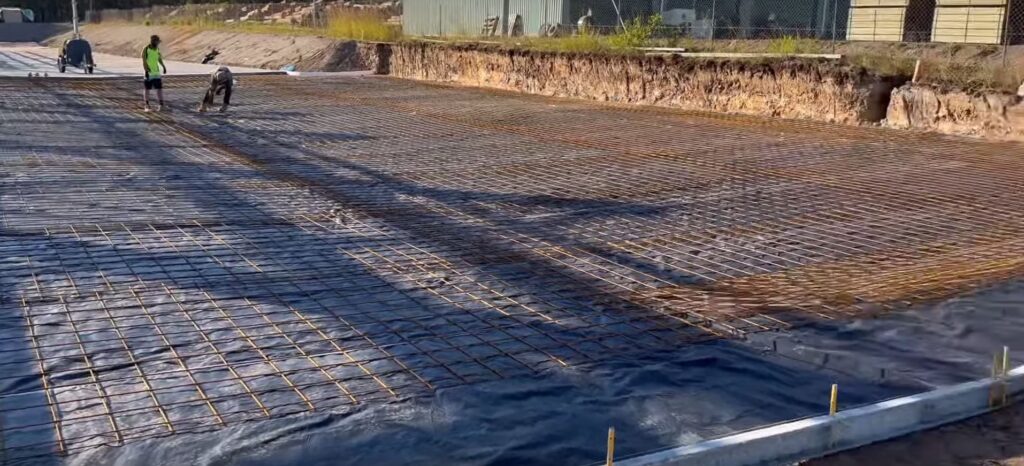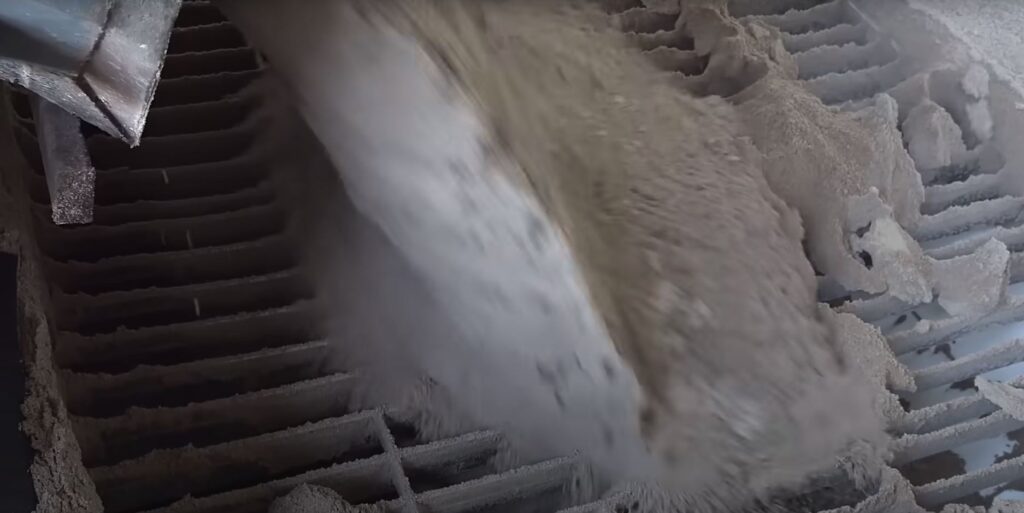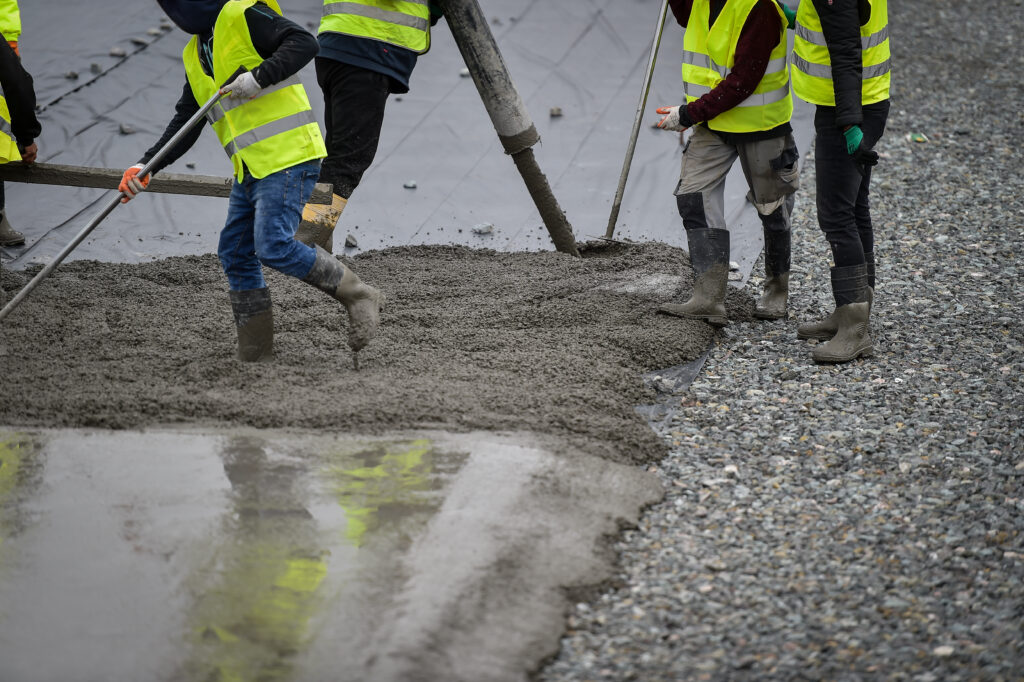Understanding the Basics: Concrete Thickness in Car Parks
Concrete thickness in car parks is a crucial factor ensuring the strength and durability of the pavement. It’s not a one-size-fits-all approach. The thickness is tailored based on the specific needs and the amount of traffic expected. Typically, in Auckland, the concrete thickness for car parks ranges from 100mm to 150mm. However, it’s essential to know that this isn’t a fixed standard.
Factors Influencing Concrete Thickness
When it comes to determining the optimal thickness of concrete for a car park, several factors come into play. A nuanced understanding of these factors can make a substantial difference in the durability, safety, and longevity of the finished product. Here’s a more detailed look:
Traffic Load
Heavy-Duty Traffic: Areas expected to accommodate heavy vehicles like buses, trucks, or trailers need robust concrete slabs. These vehicles exert significant pressure, and thus, thicker slabs prevent early wear and tear. Typically, thickness might increase by 25-50mm for areas with consistent heavy-duty traffic.
Light Traffic: Passenger vehicles like cars and motorbikes exert less pressure. For car parks mainly accommodating these vehicles, the typical 100mm to 150mm range suffices.
Ground Preparation and Soil Type
Stable Soils: If the underlying soil is stable, like clay, the required concrete thickness might be at the lower end of the spectrum.
Loose Soils: Sandy or loamy soils can shift over time. To counteract this instability, a thicker slab is often necessary. Sometimes, a stabilising layer or geotextile might be used beneath the concrete for added stability.
Soil Moisture Levels: In Auckland suburbs close to the coastline or water bodies, soil moisture levels might be higher, necessitating adjustments in concrete thickness or the addition of specific reinforcements.
Climate and Environmental Conditions
Rainfall: Auckland’s relatively high rainfall means that car parks must be designed to avoid water pooling. Thicker slabs, combined with appropriate grading and drainage, help mitigate this.
Temperature Fluctuations: Rapid temperature changes can cause concrete to expand and contract. Ensuring the right thickness can help in reducing the risk of cracks due to such fluctuations.
Design Lifespan
Short-Term vs. Long-Term: A temporary car park, perhaps for an event or short-term usage, might not require the same depth as a permanent structure. For long-term structures, investing in a slightly thicker slab can reduce maintenance costs in the long run.
Reinforcements Used
Steel Rebar: If the design includes reinforced steel bars (rebar), the concrete might be thicker to ensure the rebar is adequately covered and protected from potential corrosion.
Mesh or Fibres: These reinforcements, while adding strength, might not necessitate a significant increase in thickness, but their presence and placement are vital considerations in the design phase.
Expansion and Contraction Joints
Spacing: The placement and spacing of these joints can influence the thickness decision. Closer joints might allow for slightly thinner slabs, while wider spacing could require an increase in depth to prevent random cracking.
Understanding these factors is not just about technical compliance. It’s about ensuring that the car park remains safe, functional, and aesthetically pleasing over its intended lifespan. It’s always beneficial to consult expert concreters, especially in unique scenarios or challenging terrains, to make the best decisions regarding concrete thickness.
Health and Safety Considerations
When pouring and setting concrete, especially for large areas like car parks, it’s essential to:
- Ensure the mixture is consistent and free from contaminants.
- Use proper reinforcement, like rebar or mesh, especially if the thickness is on the lower end of the scale.
- Follow best practices for curing to avoid cracks or premature wear.
It’s worth noting that slip hazards can occur, especially in Auckland’s frequent rain. Hence, considering texture and finish is vital to enhance safety.
Concrete Alternatives and Their Thickness
While standard concrete is the go-to for many projects, there are alternatives:
- Pervious Concrete: Used in areas like Ponsonby, this allows water to pass through, reducing runoff. Its thickness is usually around 150mm.
- Stamped Concrete: Common in places like Parnell for its decorative appeal, this might vary in thickness based on design but typically hovers around 100mm to 120mm.
The Auckland Exception
While the standard practices are followed throughout New Zealand, Auckland’s booming construction growth and unique geology sometimes demand a shift from the norm. Ensuring proper drainage, given Auckland’s rainfall, often leads to slight modifications in design, ensuring longevity and performance.
The Cost Implication
Thicker concrete, while offering durability, also comes with a higher price tag. However, considering the costs of repairs and maintenance, it’s often an investment worth making. Those living in suburbs like Onehunga or Henderson might notice varying costs based on local contractors and the specific challenges of the site.
Technical Aspects: Going Beyond the Basics
Getting into the nitty-gritty, engineers consider aspects like flexural strength, tensile strength, and compressive strength. These technical parameters provide a deeper understanding of how thick the concrete should be, especially when we account for factors like soil movement, tree roots, and groundwater in Auckland’s varied terrains.
Why Engage Professional Concrete Driveways Auckland?
Concrete thickness is just one piece of the puzzle. With Professional Concrete Driveways Auckland, you’re not just getting a slab of concrete. You’re getting expertise, quality, and assurance that your car park will withstand the test of time, be it in the heart of Auckland CBD or the suburbs. From understanding the right mix to the final finishing touches, let the experts handle it.
For those seeking a deeper dive into the engineering behind it or needing a custom solution for a unique space, engaging with seasoned concreting professionals is the best route forward.
Comparing Concrete Types: A Quick Look
| Type | Typical Thickness | Best for |
| Standard | 100mm-150mm | General car parks |
| Pervious | Around 150mm | Areas needing drainage |
| Stamped | 100mm-120mm | Decorative purposes |
Whether it’s your commercial space in Mt. Eden or a residential project in Remuera, understanding the thickness and intricacies of concrete in car parks is crucial. It’s not just about laying down a layer of concrete; it’s about ensuring safety, durability, and cost-effectiveness.
FAQs: Concrete Thickness for Auckland Car Parks
What is the standard concrete thickness for car parks in Auckland?
While there’s no one-size-fits-all answer, most car parks in Auckland designed for light vehicles have a concrete thickness ranging from 100mm to 150mm. However, this can vary based on several factors like soil type, expected traffic load, and environmental conditions.
Do I need a thicker slab for a multi-level car park?
Multi-level or multi-storey car parks might require different thicknesses for each level. Ground levels, particularly those accommodating heavier vehicles, might need a thicker slab. Upper levels could vary based on the design, reinforcement, and intended load.
How do soil conditions in Auckland influence concrete thickness?
Auckland’s diverse terrains, from coastal regions to urban areas, mean varied soil types. Sandy or loamy soils, common in some suburbs, might necessitate a thicker slab or additional stabilisation measures, while stable clay-rich soils might not require as much thickness.
Does Auckland’s rainfall affect how car parks are constructed?
Absolutely. Given Auckland’s rainy climate, car parks need to be designed with optimal grading and drainage to prevent water pooling. Sometimes, a thicker slab can help achieve this, especially when combined with suitable drainage solutions.
How often do I need to check the thickness and condition of my car park?
Regular maintenance and inspections are crucial. For commercial car parks with high traffic, a yearly professional inspection is advisable. For smaller, private car parks, a bi-yearly or every two-year check would suffice.
Are there specific regulations in Auckland regarding car park constructions?
Yes, Auckland has specific building codes and regulations that cover car park constructions. It’s essential to consult with local authorities or engage firms like Professional Concrete Driveways Auckland to ensure compliance and quality.
Can I reduce costs by opting for a thinner concrete slab?
While a thinner slab might reduce initial costs, it could lead to higher maintenance and repair expenses in the long run, especially if the slab isn’t suited to its intended purpose. It’s always best to choose the optimal thickness based on professional advice and long-term considerations.
How do reinforcements like steel rebar or fibres affect thickness?
Reinforcements add strength to the concrete slab. If using steel rebar, the concrete usually needs to be thicker to ensure the rebar is adequately covered and protected from potential corrosion. Mesh or fibres, on the other hand, might not significantly change the required thickness but are vital for added strength.
Key Takeaways: Concrete Thickness for Auckland Car Parks
Varied Thickness Standards:
While there’s a general range for concrete thickness in Auckland car parks (typically 100mm to 150mm for light vehicles), the actual thickness can vary based on numerous factors, including expected traffic load and soil type.
Auckland’s Diverse Terrain:
Auckland’s varied terrains, from coastal regions to more urban landscapes, contribute to diverse soil conditions. This means the required concrete thickness can differ substantially even within the city, based on the specific location.
Importance of Drainage:
Auckland’s frequent rainfall necessitates car parks with proper grading and drainage. The thickness of the concrete slab can play a role in achieving this, ensuring water doesn’t pool and degrade the surface over time.
Reinforcements Add Strength:
Using reinforcements like steel rebar or fibres can enhance the strength and durability of the concrete slab. While they might influence the slab’s thickness, especially in the case of steel rebar, their primary role is to ensure the concrete can handle the load and stress.
Regulations and Compliance:
Auckland has specific building codes and standards related to car park constructions. Adhering to these is crucial, not only for safety and durability but also to ensure legal compliance.
Cost Versus Longevity:
While it might be tempting to cut costs with a thinner slab, the long-term implications can be more expensive. Optimal thickness, based on professional advice, can reduce future maintenance and repair expenses, ensuring the concrete car park remains functional and safe for longer.




